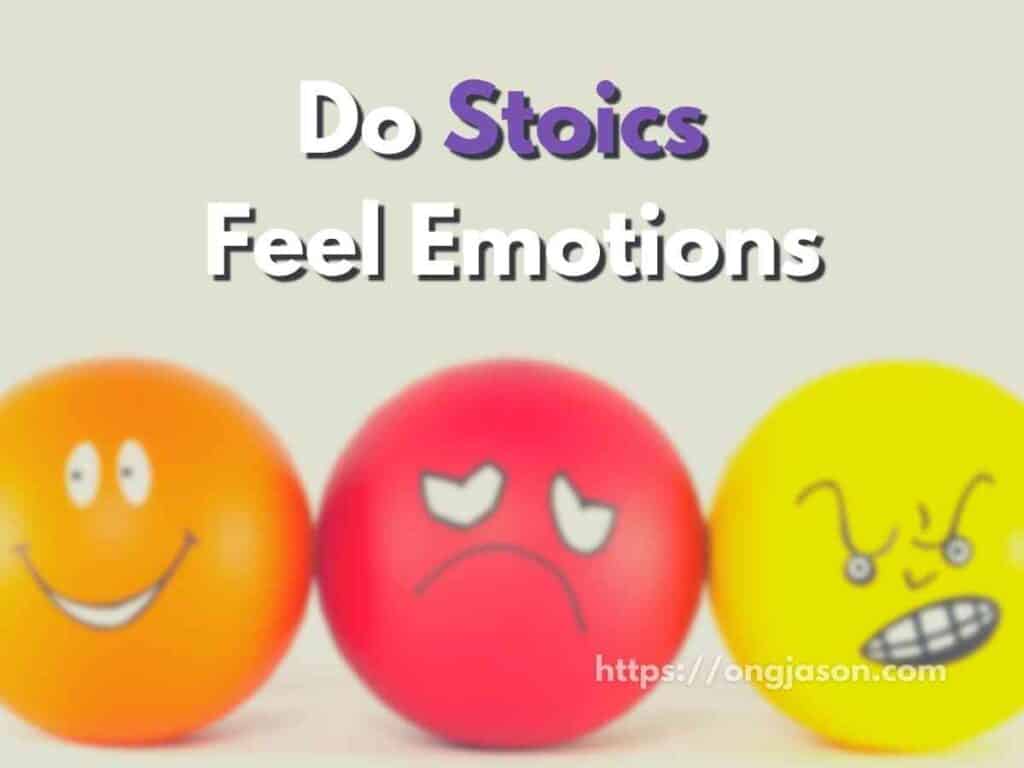Stoicism: Does it Make You Emotionless?
One of the reasons why people think of Stoics as emotionless is because we’ve seen Spock from Star Trek. Right now, because of the rising popularity of Stoicism, many people are thinking that being stoic means being cold and emotionless. However, is that really the case? Does Stoicism make a person emotionless? Let’s find out.
Stoics don’t suppress emotions. Instead, they react properly to emotions by being virtuous. Many people think of Stoicism as Apathy which isn’t true. Stoicism is about handling our emotions, while Apathy is about suppressing our emotions. These two are entirely different.
In this blog post, I will share with you a brief introduction to Stoicism and why you shouldn’t interchange it with Apathy. We are also going to learn how a Stoic handles emotions.

Does Stoicism Make You Emotionless?
Stoicism doesn’t make a person emotionless. In fact, Stoicism is about accepting and reacting appropriately to emotions. Stoicism would make a person emotionless only if they view Stoicism in the wrong way. Therefore, Stoicism is not and should not be interchanged with Apathy.
The notion that Stoicism makes a person emotionless is not true.
Stoics accept emotions because it is close to impossible to reject them.
The Stoics believe in the dichotomy of control. This simply means that there are things you can and can’t control.
As humans, one of the things we can’t control is feeling emotions.
Emotions are greatly instilled inside our brains. Because of that, if we apply the dichotomy of control, as a Stoic, you shouldn’t try to repress it since you can’t do something about it.
However, Stoics look very logical and less emotional because they know how to handle or react appropriately to emotions.
In fact, Marcus Aurelius, a Stoic philosopher, consistently pointed out that there is a difference between being free from passion and being free from emotions.
For him, passion is the surge of emotions. In short, it is too many emotions that can hurt our judgment. Passion is acting all based on emotions without logical thinking.
Emotions, on the other hand, are regular occurrences we can control.
A Stoic knows how to be free from passion, not from emotions.
For example, if a person is angry, they can cause tantrums and make false judgments.
Or a person can be emotionally attached to shopping sprees, making them think illogically when purchasing.
The problem is not emotions. Instead, it is experiencing too many emotions that can cause us to lose our logic.
According to Marcus Aurelius, that’s called passion.
Thus, Stoicism is not about removing emotions. Removing emotions is close to impossible and is outside a person’s dichotomy of control.
That means Stoicism should not be interchanged with Apathy. Being apathetic means repressing emotions, while Stoicism is about handling emotions based on logic and values.
Later on, we will discuss how do Stoics handle these emotions. That way, your knowledge about Stoics and emotions will be complete.
For now, let’s talk more about why Stoicism does not mean Emotionless.
Does Stoicism Mean Being Emotionless?
Stoicism does not mean being emotionless. Instead, Stoicism is a philosophy which talks about how to react to emotions appropriately. Furthermore, Stoicism came from the word “Stoa,” which means painted porch, and did not come from the word emotionless.
As we’ve already discussed earlier, Stoicism is not being emotionless.
Stoicism is about acting appropriately to emotions.
This is due to the dichotomy of control. Instead of worrying about the things that we can’t do something about, we could forget about them.
Here is an excellent example of why do people interchange the two.
Since Stoics are known for always asking themselves if things are outside their control, they tend not to react to things outside their control.
For example, if someone stole your laptop, you can have too much emotion about the incident that it can make you act on the things you might later regret.
Furthermore, it causes too much stress, which can harm your well-being.
If we think of Stoic virtues, since the laptop was already stolen, we can’t do anything about it other than tell the authorities. Other than that, we can’t control what the person who stole your belongings would think or feel.
Thus we should forget about the incident based on the dichotomy of control.
People looking at you would feel that you’re emotionless if you did that since if that were they, they would freak out if someone stole their belongings.
However, if you act like a Stoic since it’s already over and you can’t do something about it, it’s better not to care about it anymore.
Because of how this looks on the outside, people might think of a Stoic as something emotionless.
The truth is, they might have felt angry with the incident, but they also know that this is outside their control.
Thus, Stoicism is not emotionless. It is about how we handle emotions.
How Do Stoics Handle Emotions?
Stoics handle emotions by practicing emotion regulation. They practice emotion regulation by learning about the things they can and can’t control. That way, they will only react to things they can handle, which would not cause unnecessary stress.
Right now, I am going to introduce the basics of how do Stoics handle emotions.
How do Stoics act logically on these emotions?
One of the things they do is what we’ve already talked about, which is the dichotomy of control.
Using the dichotomy of control, we can stay logical on times we are emotional.
However, how are Stoics logical? I mean, where do they get their logical thinking?
The truth is, we all have our logical thinking. It has been with us for a long time. It is called inner thinking.
How the inner thinking keeps a Stoic logical
The inner thinking keeps a Stoic logical by listening to the voice inside their heads. The voice inside their heads is acting based on logic and values. That is why Stoics are very particular in following virtues instead of relying on their emotions.
So what is inner-thinking? Well, we all have it.
It is the voice inside your head telling you to study for your exams instead of watching TV all day.
It is also the voice inside your head that tells you you should eat healthy instead of relying on fast-food restaurants.
The Stoics think of inner thinking as their logical thinking. It is the thought that gives them the right thing to do. Inner thinking is usually based on your values.
If you think about it, we usually stop this inner thinking if we’re very emotional. Then when we’re back to our senses, we can hear our inner thinking making us feel guilty.
For Stoics, our inner thinking is our guide. It is the thing we need to train with virtues since it acts based on logic.
The Stoics follow four virtues that guide this inner thinking. These are wisdom, courage, justice, and moderation.
Now that you have the basics of Stoic philosophy, you now understand how the Stoics stay logical. They use the dichotomy of control, emotion regulation, and inner thinking.
Stoicism is not being emotionless. Instead, it is about controlling this emotion so that these emotions won’t turn to passion.
What’s next? For a guide on the Stoic virtues and how to Stoics live a happy life, I made another blog post that you can read if you’re interested. You can find it here: Do Stoics live a happy life?

“Only the things I love.“
ongjason.com is reader-supported. When you buy through links on the site, I earn an affiliate commission.
If you’re following me, you’ll know that I believe it is essential to have some tools, whether it’s for personal development or lifestyle in general.
So, here are the things I love.
YouTube
If you want to learn things for free, I recommend watching my YouTube Channel. Click the Button Below to go straight into my Channel. 🙂
Okay, let me first explain my Channel.
I believe that I really can’t explain everything too well on my blog. That’s why I created a YouTube Channel so I can easily explain a lot of things. Plus, I believe that Video Sharing is the future.
Recommended Books
The next thing is books. Books are, for me, one of the cheapest ways to get invaluable information. We can learn personal development, finance, career, relationships, and many more from books.
Here, I will be listing my favorite books in different categories.
- For Beginners – 7 Habits of Highly Effective People by Stephen Covey – Personal development has a lot of concepts and ideas to learn. Thus it can be really hard for beginners to know where to start. Thus, I recommend this book since all the basic concepts of personal development are here(except finance, check what I recommended for that)
- Productivity – The One Thing by Gary Keller – This book teaches us the power of focusing on one thing which is the ultimate source of productivity. The concepts taught are what I am using to constantly publish YouTube videos while maintaining this website.
- Busy? – Make Time by Jack Knapp – This book teaches us how to make time for the things we love. The concept is really simple but I think that makes it a book worth reading.
- Health – Lifespan by Dr.Sinclair – This Book teaches about the latest scientific research on lifespan. In his book, he has shared numerous things he is doing to slow down his aging process. This can be as easy as eating less which he recommends.
- Finance – The Richest Man in Babylon by George Clason – Perhaps one of the first books I’ve read about Finance, this book for me is the best if we are talking about learning basic finance such as basic saving and investing. The concepts are very simple but effective.
Audiobooks
Take this advice as a grain of salt.
I don’t recommend buying Audiobooks one by one. I mean, audiobooks can be quickly finished by listening while working out or doing some mindless tasks.
So here is to save you some money. Just go for a monthly subscription to Audible. I believe that you will save a lot of money with that plus, they usually give freebies to anyone starting.
My Audiobook Recommendation will always be the same as my book recommendations, but I personally like The 5 Second Rule by Mel Robbins. I like how she is so casual while reading her book.




![Why is studying so exhausting [9 Reasons]](https://ongjason.com/wp-content/uploads/2021/07/Tired-Studying-768x576.jpg)


